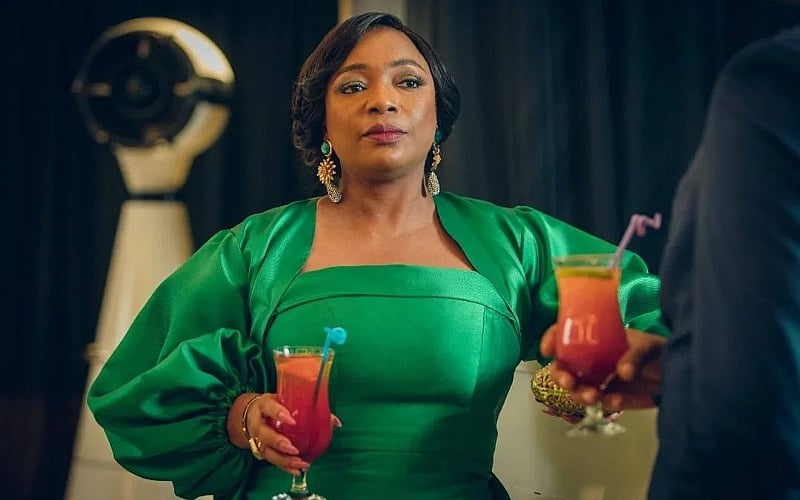In a society where the milestones of a woman’s life are often dictated by cultural traditions and societal expectations, few public figures have dared to challenge the narrative as openly as Nollywood veteran Bimbo Akintola. At 52, with a career spanning more than three decades in the Nigerian film industry, Akintola has not only carved out a reputation as one of the country’s most talented actresses but also as a woman unafraid to chart her own path. Recently, in a candid conversation with fellow actress Biola Bayo, she peeled back the curtain on her personal life, exposing the pressures, choices, and convictions that have defined her journey. What emerged was not just the story of one woman’s refusal to bow to pressure, but a broader reflection on gender roles, the meaning of partnership, and the evolving realities of marriage in modern Nigeria.
Her words—calm, deliberate, and deeply personal—struck a chord because they highlighted a tension that many Nigerian women silently wrestle with: the pressure to marry early, the fear of societal judgment, and the struggle to prioritize personal peace over conformity. Akintola’s revelation that she has turned down multiple marriage proposals, insisting on waiting for the right partner rather than marrying for the sake of it, is both a defiant stance and a wake-up call.
A Star Who Refuses to Be Defined by Marital Status
Bimbo Akintola’s name is synonymous with Nollywood’s golden age. From her breakout role in Out of Bounds alongside Richard Mofe-Damijo in 1997, to her unforgettable performances in films like 93 Days and Heaven’s Hell, she has consistently proven her versatility as an actress. Yet despite her acclaim, much of the public conversation about her life has centered not on her craft, but on her personal choices—particularly her marital status.
In Nigeria, where cultural norms still place enormous emphasis on marriage as the ultimate validation of a woman’s life, being unmarried past 30 is enough to spark gossip. To cross into one’s 40s and 50s without tying the knot often attracts whispers, judgment, and unsolicited advice. For Akintola, however, such scrutiny has never been a reason to compromise.
“For me not to have found my partner, the person I want to spend the rest of my life with, I don’t see it as a negative,” she told Bayo. “I’ve been proposed to many times, and I’ve said no.”
The weight of those words lies not just in their honesty but in their defiance. Saying no to multiple marriage proposals in a society where women are often pressured to accept out of fear of being labeled “too picky,” “too old,” or “leftover” is a radical act.
The Trap of Marrying for the Wrong Reasons
Akintola’s rejection of proposals is not rooted in disdain for marriage itself but in her belief that the wrong marriage can be far more destructive than staying single. Her perspective is borne out by reality. Nigeria has witnessed a surge in divorce and separation cases over the past two decades, many of them stemming from unions entered into hastily or under societal pressure.
She pointedly criticized the culture of rushing into marriages for appearances, arguing that it often leads to broken homes. For her, the choice to wait is not one of stubbornness but of wisdom. “Marriage is not a race or a competition,” she stressed. “It’s not about how early you start, but about who you start with.”
The actress’s stance resonates deeply in a society where women are often conditioned to see marriage as an achievement, a status symbol that validates their worth. Yet she challenges this notion, insisting instead that personal happiness and compatibility matter far more than social approval.
A Call for Equal Responsibility
Beyond her personal life, Akintola used the conversation to address a broader cultural imbalance that has long plagued Nigerian society: the uneven expectations placed on boys and girls. With a passion that reflected both frustration and hope, she argued for raising sons and daughters with the same sense of responsibility.
“Teach your sons that their body is the temple of God the same way you teach your daughters,” she admonished. “As soon as you impregnate a girl, no more school for you, my dear. Go and work and raise your child.”
This statement was a sharp critique of a cultural double standard that excuses men from accountability while placing disproportionate burdens on women. In many Nigerian communities, a young girl who becomes pregnant is often stigmatized, her education abruptly halted, and her life trajectory permanently altered. Meanwhile, the boy responsible frequently escapes unscathed, allowed to continue his education and pursue his ambitions without consequence.
Akintola’s call was for balance. If society demands responsibility from girls, it must do the same for boys. To her, true equality begins at home, in the way children are raised and the values instilled in them.
Redefining What Women Should Value in Men
The conversation also turned toward relationships and the pervasive culture of materialism that often shapes them. In an era where social media flaunts wealth and glorifies luxury lifestyles, many young women are under pressure to align themselves with rich men at all costs. Akintola pushed back against this narrative, urging women to focus on qualities that truly matter.
“Don’t focus on rich men,” she said. “Focus on men who are hardworking and ready to grow with you.”
Her words cut to the heart of a modern dilemma. In a society ravaged by economic hardship, the temptation to equate financial stability with emotional security is strong. Yet Akintola warned against this short-sightedness, arguing that character, work ethic, and shared values are far more reliable foundations for lasting partnerships than wealth alone.
The Online Harassment of Women Who Choose Differently
Akintola’s candidness also shed light on another challenge faced by women who choose unconventional paths: online harassment. In Nigeria’s hyper-connected digital space, women who remain unmarried or who prioritize personal peace over societal expectations are often targets of ridicule. Social media amplifies these voices, subjecting women to relentless criticism and mockery.
For many, this harassment is not just about marital status but about defiance. Women who refuse to conform are seen as threats to the established order. Yet Akintola’s resilience offers a counter-narrative. By speaking openly about her choices, she not only validates her own journey but also empowers others to embrace theirs, regardless of public opinion.
Choosing Peace Over Pressure
At the heart of Akintola’s message is the simple yet profound decision to choose peace over pressure. To her, settling for a marriage that does not align with her values would be a betrayal of herself. In a world where women are often celebrated for sacrificing their dreams, she stands out for insisting that true fulfillment lies in staying authentic.
Her story is not one of loneliness but of agency. It is a reminder that marriage, while beautiful, is not the sole measure of a life well-lived. For Akintola, happiness comes from living on her own terms, from refusing to allow societal expectations to dictate her destiny.
The Broader Implications for Nigerian Society
Akintola’s revelations are more than personal confessions; they are a mirror held up to Nigerian society. They force uncomfortable questions: Why is a woman’s worth still tied to her marital status in 2025? Why do boys grow up without being held to the same standards of responsibility as girls? Why is wealth celebrated more than character in relationships?
Her story speaks to a larger cultural shift that is slowly, though unevenly, taking place. More Nigerian women are prioritizing self-fulfillment, education, and career over early marriage. More voices are challenging the patriarchal norms that have long silenced women’s choices. Akintola’s stance is part of this growing wave, one that is reshaping conversations about gender, partnership, and personal freedom.
Conclusion: A Woman Ahead of Her Time
Bimbo Akintola’s decision to remain single until she finds a partner who aligns with her values is not an act of defiance against marriage but an affirmation of self-worth. It is a refusal to bow to pressure, a commitment to peace, and a challenge to societal norms that have long stifled women’s choices.
Her story is deeply personal, yet universally resonant. It is about more than proposals rejected; it is about the courage to wait for what feels right, the strength to resist conformity, and the wisdom to see marriage not as a finish line but as a partnership built on mutual respect and shared vision.
In speaking her truth, Akintola has done more than defend her own choices; she has opened a broader dialogue about what it means to live authentically in a world that constantly demands conformity. Her journey is a reminder that fulfillment comes not from meeting society’s expectations but from honoring one’s own.
And perhaps, in that truth, lies the greatest lesson of all.




